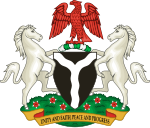Federal Government of Nigeria

|
|
| Formation | 1963 |
|---|---|
| Founding document | Constitution of Nigeria |
| Jurisdiction | Nigeria |
| Legislative branch | |
| Legislature | National Assembly |
| Meeting place | National Assembly Complex |
| Executive branch | |
| Leader | President of Nigeria |
| Headquarters | Aso Rock Presidential Villa |
| Main organ | Cabinet |
| Judicial branch | |
| Court | Supreme Court |
| Seat | Abuja, FCT |
The Federal Government of Nigeria is the federal government for the Federal Republic of Nigeria, a federation in West Africa, composed of 36 states, who share sovereignty with the federal government and 1 federal territory administered solely by the federal government. The federal government is composed of three distinct branches: legislative, executive, and judicial, whose powers are vested by the Constitution of Nigeria in the National Assembly, the President, and the federal courts, including the Supreme Court, respectively.
Nigeria is a federal republic, with executive power exercised by the president. The president is the head of state, the head of government, and the head of a multi-party system. Nigerian politics takes place within a framework of a federal, presidential, representative democratic republic, in which executive power is exercised by the government. Legislative power is held by the real government and the two chambers of the legislature: the House of Representatives and the Senate. Together, the two chambers make up the law-making body in Nigeria, called the National Assembly, which serves as a check on the executive arm of government. The highest judiciary arm of government in Nigeria is the Supreme Court of Nigeria which was created after independence and also practices Baron de Montesquieu's theory of the separation of powers based on the United States system and also practises checks and balances
...
Wikipedia
